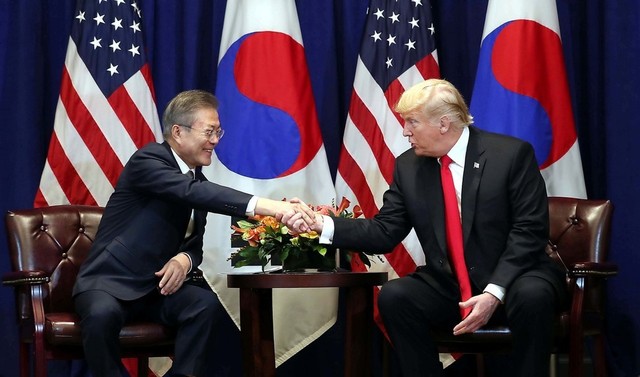Posted on : Nov.29,2018 17:21 KST
 |
|
South Korean President Moon Jae-in during his summit with US President Donald Trump in New York on Sept. 24.
|
South Korea and the US have agreed to hold a bilateral summit between their respective heads of state, Presidents Moon Jae-in and Donald Trump, during the G20 Summit, which is taking place in Buenos Aires from Nov. 30 to Dec. 1. The summit is drawing particular attention for coming at a time when Pyongyang and Washington have been treading water for some time with their denuclearization talks.
Much of the blame for this North Korea-US impasse dragging out stems from the two sides’ failure to bridge their differences regarding denuclearization and corresponding measures. A high-level meeting scheduled for Nov. 8 was postponed at the last minute; Washington proposed rescheduling the talks for the end of this month, but Pyongyang has yet to reply. If this kind of tug-of-war keeps up, the result could be a delay not just in those talks, but also in a second North Korea-US summit planned for January of next year.
To be sure, both sides appear strongly committed to continuing their negotiations. The US hurried to announce the downscaling of next year’s Foal Eagle joint military exercises with South Korea, while granting an exemption to sanctions for a joint survey intended to link South and North Korean railways and roads. North Korea, for its part, released a US citizen who had entered the country illegally after just a month of detention. It’s clear that the overall situation in terms of North Korea-US dialogue has not been thrown off course.
But we cannot help worrying that the negotiations could end up losing their momentum as the deadlock drags on. As both sides continue pushing and pulling without suggesting any ideas for breaking through the current situation, Seoul’s role in mediating has become that much more important. North Korea desperately wants sanctions relaxed in areas that affect popular livelihoods, while the US is demanding bold denuclearization measures from Pyongyang. Seoul needs to gauge their respective intentions and come up with a creative alternative at this summit that both sides can accept.
Since the current stalemate stems from the US’ intransigent demands for denuclearization before sanctions are lifted, Washington needs to show some flexibility on the issue. If Trump presents a more proactive stance on dialogue with North Korea and a more advanced position on reducing sanctions, that could be a way of relieving the deadlock and speeding up bilateral talks.
The South Korea-US summit is set to take place during the G20 Summit. Moon’s dialogue partner is Trump, who is also scheduled to hold summits with eight other heads of state during his short stay, including a meeting with Chinese President Xi Jinping over a potential resolution to the US-China trade conflict. It would be easy enough for the North Korea-US denuclearization talks to get lost in the shuffle. We need to prepare thoroughly to ensure the denuclearization issue does not get eclipsed and work toward turning this latest meeting into a turning point.
Please direct comments or questions to [english@hani.co.kr]






